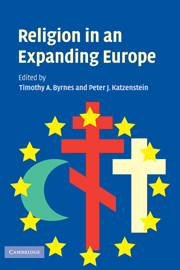Book contents
- Frontmatter
- Contents
- List of contributors
- Preface
- 1 Multiple modernities as limits to secular Europeanization?
- Part I European settings
- Part II Catholicism
- 4 The old Church and the new Europe: charting the changes
- 5 Thy will be done: the Catholic Church and politics in Poland since 1989
- Part III Orthodoxy
- Part IV Islam
- Part V Conclusion
- References
- Index
5 - Thy will be done: the Catholic Church and politics in Poland since 1989
Published online by Cambridge University Press: 22 September 2009
- Frontmatter
- Contents
- List of contributors
- Preface
- 1 Multiple modernities as limits to secular Europeanization?
- Part I European settings
- Part II Catholicism
- 4 The old Church and the new Europe: charting the changes
- 5 Thy will be done: the Catholic Church and politics in Poland since 1989
- Part III Orthodoxy
- Part IV Islam
- Part V Conclusion
- References
- Index
Summary
Poland and its Church have long fascinated observers. The Church's role in the legendary resistance of the Poles to tsarist rule and later to communist rule, the devotion of Polish bishops and priests to the interests of the Polish people in times of hardship, and the enormous popularity of the Church throughout the communist era and its considerable political clout in the post-communist era make this Church worthy of study. The Catholic Church in Poland has, moreover, been able to make its voice heard and to make a difference in the continent-wide debate, in a way that, let us say, the Catholic Church in Slovenia or Croatia or Slovakia or Austria or Romania has not.
Traditionally, in Catholic teaching, what happens on earth should reflect, as much as possible, God's will; political power, accordingly, can be viewed as a sword, whose wielder can either contribute to realizing the promise that “thy will be done on earth as it is in heaven,” or set up obstacles to that project. This is also an important reason why, as Daniel Philpott and Timothy Shah note in their contribution to this volume, the Catholic Church has been wary of state sovereignty; but the problem is not the institutional form of the state as such, so much as its secular character, and, insofar as the EU is conceptualized as a secular union, its threat to Church interests is greater, not less, than the threat already posed by the secular state.
- Type
- Chapter
- Information
- Religion in an Expanding Europe , pp. 117 - 147Publisher: Cambridge University PressPrint publication year: 2006
- 16
- Cited by



